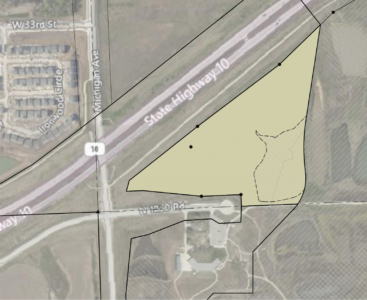Extensive staff training, grievance processes and more outlined in operations manual for The Village

photo by: Austin Hornbostel/Journal-World
The gated entry to The Village, 256 N. Michigan St., is pictured on Friday, Jan. 5, 2024. The site is home to 50 Pallet cabins for people experiencing homelessness.
When The Village — Lawrence’s new project to house the homeless — eventually opens at 256 N. Michigan St., it’ll also come with extensive staff training, a strict mid-evening curfew and a grievance process for nearby neighbors and businesses.
That’s all according to the operations manual for the community of 64-square-foot Pallet cabins, which is set to be run by the Lawrence Community Shelter. The City of Lawrence provided the Journal-World with a copy of the manual, and it sheds further light on what the resource is intended to look like once it’s up and running.
Here are some of the highlights of the document:
Staffing support
The manual calls for a minimum of two “supportive and suitable” staff to be present on site 24/7 to ensure safety, maintain a sense of community and ensure the well-being of residents and the surrounding neighborhood.
Those staff members will include case managers, supervisors, monitors and contracted service providers with the city that will handle maintenance services and site upkeep. The manual notes that LCS will “make every attempt” to hire people with lived experience who are from the community and representative of the population they’re serving.
While the manual doesn’t indicate exactly how many staff members there will be at The Village, it does provide thorough explanation of how new hires will be trained. Here’s the full list of core training areas: Persons-centered case management, effective interactions with residents, housing first and low-barrier practices, harm reduction, overdose prevention and intervention, trauma-informed care including secondary trauma, mental health first aid, nonviolent crisis intervention, stages of change/motivational interviewing, equal access gender identity policy, boundaries and burnout, emergency evacuation procedures, domestic violence and safety planning, CPR, first aid, communicable disease procedures, and cultural responsiveness.
All of that training will be important, since the manual notes that LCS expects “all reasonable measures” will be taken to avoid interaction with law enforcement and instead rely as much as possible on support-oriented and harm reduction-focused approaches to conflict resolution.
“Staff will work with guests, make frequent check-in with guests and make observation of the site and neighborhood to ensure that the emergency shelter community is a good neighbor,” the manual reads. “Skilled site-based staff will work to promote safety and a supportive shelter environment.”
Referrals, admission and policies
Who will live at The Village will be determined based on Douglas County’s “by name list,” which is intended to document information about homeless individuals who are actively engaged in supportive services through area agencies. The agency list includes organizations like Bert Nash Community Mental Health Center, the Treatment and Recovery Center of Douglas County, the Kansas Statewide Homeless Coalition and the Sexual Trauma and Abuse Care Center. The Lawrence Police Department, Douglas County Sheriff’s Office and Lawrence-Douglas County Fire Medical are also capable of placing community members on the by name list.
Upon arrival, residents at The Village will go through an intake process that includes collection of basic information, a review of the site’s policies and procedures, and an agreement to schedule appointments to meet with a case manager within two days of arriving. Residents will also be provided access to basic needs like bedding, water, food, medications and personal hygiene products.
Some policies were covered by city staff during a recent media tour of The Village, including items that won’t be allowed on site and the process for how residents will check in when entering or exiting The Village.
The operations manual provides substantially more details as far as policies are concerned. One that’s especially notable is that residents must participate in “community co-care,” which means working in partnership with staff to identify ongoing community service opportunities and contributing a certain number of hours per week for the benefit of the community.
That could include tasks like gardening, site clean-up and trips to food banks. Residents will also be asked to attend weekly meetings in The Village’s community building to discuss how the community is operating.
The Village is also subject to special quiet hours from 10 p.m. to 7 a.m., on top of the city noise ordinance that applies 24 hours a day. The permit conditions for the site stipulate that amplified music and other amplified sounds aren’t permitted at any time.
Along with the quiet hours, residents will be subject to a 7 p.m. nightly curfew, except in cases of a documented emergency or with an approved late pass for something like a night job. Residents who don’t meet curfew without securing a late pass from a case manager will be expected to meet with them the following day to discuss it. Guests who are absent overnight will be considered a “voluntary discharge” and will have to meet with a case manager to have it reversed.
A discharge will be initiated if residents display behaviors that disrupt or jeopardize the health or safety of other residents, staff or neighbors, or if they refuse to comply with site rules or case plans. The manual notes that discharges are initially set by a supervisor on site for specific periods of time — such as 12 to 24 hours or until the following business day — and are then reevaluated to determine the full duration of a ban. Individuals who are banned from The Village will be required to leave the site as directed and stay at least 3,000 feet away, or more than a half-mile.
In terms of other miscellaneous policies of note, the site description portion of the manual notes that The Village will provide temporary accommodation for up to 50 individuals with 10 units being ADA-accessible. However, there are currently only four units on site fitting that requirement. The manual also notes that cabins will have the ability to accommodate double occupancy if necessary.
Also, during the media tour, city staff said residents won’t be allowed to keep pets, but the operations manual says registered service animals with the appropriate paperwork will be allowed at the Pallet site. Guests will be required to sign a pet policy agreement.
Grievance procedures
The operations manual lays out a lot of details regarding grievance procedures both for internal disputes and for nearby neighbors and businesses.
“It is the goal of LCS to ensure clear and transparent communication with guests of the shelter community and the surrounding neighborhood to develop trust and to increase the likelihood of successful outcomes,” the manual reads.
The internal procedure, at a minimum, will include reporting issues to an available staff member and discussing concerns with a case manager or community manager. Then, staff will work with residents “using a trauma-informed and restorative approach” to resolve the issue.
The external grievance process starts with concerns or suggestions from the surrounding neighborhood being received by the site supervisor. These types of grievances, instead of being resolved internally, will be taken to the LCS executive director if a supervisor can’t provide an immediate solution.
LCS, city staff, the shelter community and support staff will meet at least once every two weeks to discuss problems, identify solutions and share information, and the city plans to provide a dedicated staff member to serve as a liaison to The Village.
Along with those procedures, The Village will also offer a regular forum with the surrounding neighborhood through the establishment of a new homelessness coalition. The group will bring together stakeholders from the public and private sector, neighbors, faith-based groups, local businesses and government entities.
“This coalition will strive to alleviate tensions as they arise, explore opportunities for community and relationship-building and shift biases and stigma associated with operation of emergency shelters,” the manual reads. “The group will be convened by city staff in partnership with the onsite staff and neighborhood leaders.”








COMMENTS